Related Research Articles

Woodstock Music and Art Fair, commonly referred to simply as Woodstock, was a music festival held August 15–18, 1969, on Max Yasgur's dairy farm in Bethel, New York, 40 miles (65 km) southwest of the town of Woodstock. Billed as "an Aquarian Exposition: 3 Days of Peace & Music" and alternatively referred to as the Woodstock Rock Festival, it attracted an audience of more than 400,000. Thirty-two acts performed outdoors despite sporadic rain.
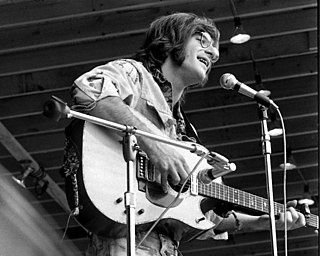
John Benson Sebastian is an American singer-songwriter, guitarist, harmonicist, and autoharpist. He is best known as a founder of The Lovin' Spoonful, as well as for his impromptu appearance at the Woodstock festival in 1969 and a U.S. No. 1 hit in 1976, "Welcome Back".

Paul Vaughn Butterfield was an American blues harmonica player, singer and band leader. After early training as a classical flautist, he developed an interest in blues harmonica. He explored the blues scene in his native Chicago, where he met Muddy Waters and other blues greats, who provided encouragement and opportunities for him to join in jam sessions. He soon began performing with fellow blues enthusiasts Nick Gravenites and Elvin Bishop.

Richard Pierce Havens was an American singer-songwriter and guitarist. His music encompassed elements of folk, soul, and rhythm and blues. He had an intense and rhythmic guitar style, and played soulful covers of pop and folk songs. He was the opening act at Woodstock.

Woodstock is a 1970 American documentary film of the watershed counterculture Woodstock Festival which took place in August 1969 near Bethel, New York.
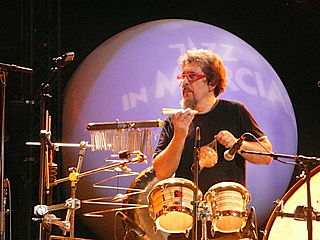
Cyro Baptista is a Brazilian percussionist in jazz and world music. He creates many of the percussion instruments he plays.
The Creative Music Studio (CMS) was a premier study center for contemporary creative music during the 1970s and 1980s, based in Woodstock, New York. Founded in 1971 by Karl Berger, Ingrid Sertso, and Ornette Coleman, it brought together leading innovators in the jazz and world music communities. Unprecedented in its range and diversity, CMS providing participants with a rare opportunity to interact personally with musical giants of improvisation and musical thought on a daily basis.

Juvenal de Holanda Vasconcelos, known as Naná Vasconcelos, was a Brazilian percussionist, vocalist and berimbau player, notable for his work as a solo artist on over two dozen albums, and as a backing musician with Pat Metheny, Don Cherry, Björk, Jan Garbarek, Egberto Gismonti, Gato Barbieri, and Milton Nascimento.

Santana is an American rock band formed in San Francisco in 1966 by Mexican-American guitarist and songwriter Carlos Santana. The band has undergone multiple recording and performing line-ups in its history, with Carlos Santana the only consistent member. Santana had early success with their appearance at Woodstock in 1969 and their first three albums, Santana (1969), Abraxas (1970), and Santana III (1971). Other important core members during this period include Gregg Rolie, Michael Carabello, Michael Shrieve, David Brown, and José "Chepito" Areas, forming the "classic" line-up.

The Harlem Cultural Festival was a series of music concerts held in Harlem, Manhattan, New York City during the summer of 1969 to celebrate African American music and culture and to promote the continued politics of black pride.
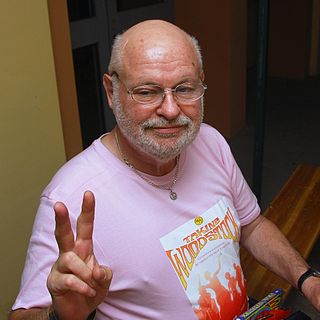
Elliot Michael Tiber was an artist, professor, and screenwriter who wrote a memoir about the Woodstock Festival held in Bethel, New York in 1969. He claimed responsibility for the relocation of the festival after a permit for it was withdrawn by the zoning board of a nearby town.
Codona was a free jazz and world fusion group which released three self-titled albums on the ECM label in 1979, 1981 and 1983. The trio consisted of multi-instrumentalists Don Cherry, Collin Walcott, and Nana Vasconcelos. The name of the group was derived from the first two letters of the musicians' first names.
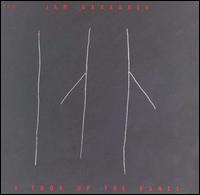
I Took Up the Runes is an album by Norwegian saxophonist Jan Garbarek released on the ECM label and performed by Garbarek, Rainer Brüninghaus, Eberhard Weber, Nana Vasconcelos, Manu Katché, and Bugge Wesseltoft with Ingor Ánte Áilo Gaup contributing vocals.

Saudades is an album by Brazilian jazz percussionist Naná Vasconcelos recorded in 1979 and released on the ECM label.

Codona 2 is the second album by the jazz trio Codona, which featured sitarist and tabla player Collin Walcott, trumpeter Don Cherry and percussionist Naná Vasconcelos. It was recorded in 1980 and released on the ECM label in 1981.

Eventyr is an album by Norwegian jazz composer and saxophonist Jan Garbarek, guitarist John Abercrombie and percussionist Naná Vasconcelos recorded in 1980 and released on the ECM label in 1981.
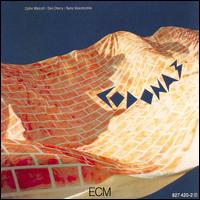
Codona 3 is the third and final album by the jazz trio Codona, which featured sitarist and tabla player Collin Walcott, trumpeter Don Cherry and percussionist Naná Vasconcelos. It was recorded in 1982 and released on the ECM label the following year.
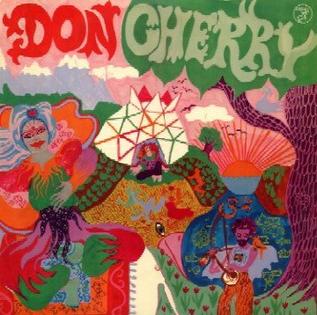
Organic Music Society is an album by trumpeter Don Cherry recorded in 1972 and released on the Swedish Caprice label.

By Any Means Necessary is the third album by saxophonist Gary Thomas recorded in 1989 and released on the JMT label.

The Tommy Tour was a concert tour by the English rock band the Who. It was in support of their fourth album, the rock opera Tommy (1969), and consisted of concerts split between North America and Europe. Following a press reception gig, the tour officially began on 9 May 1969 and ended on 20 December 1970. The set list featured the majority of the songs from Tommy, as well as originals and covers.